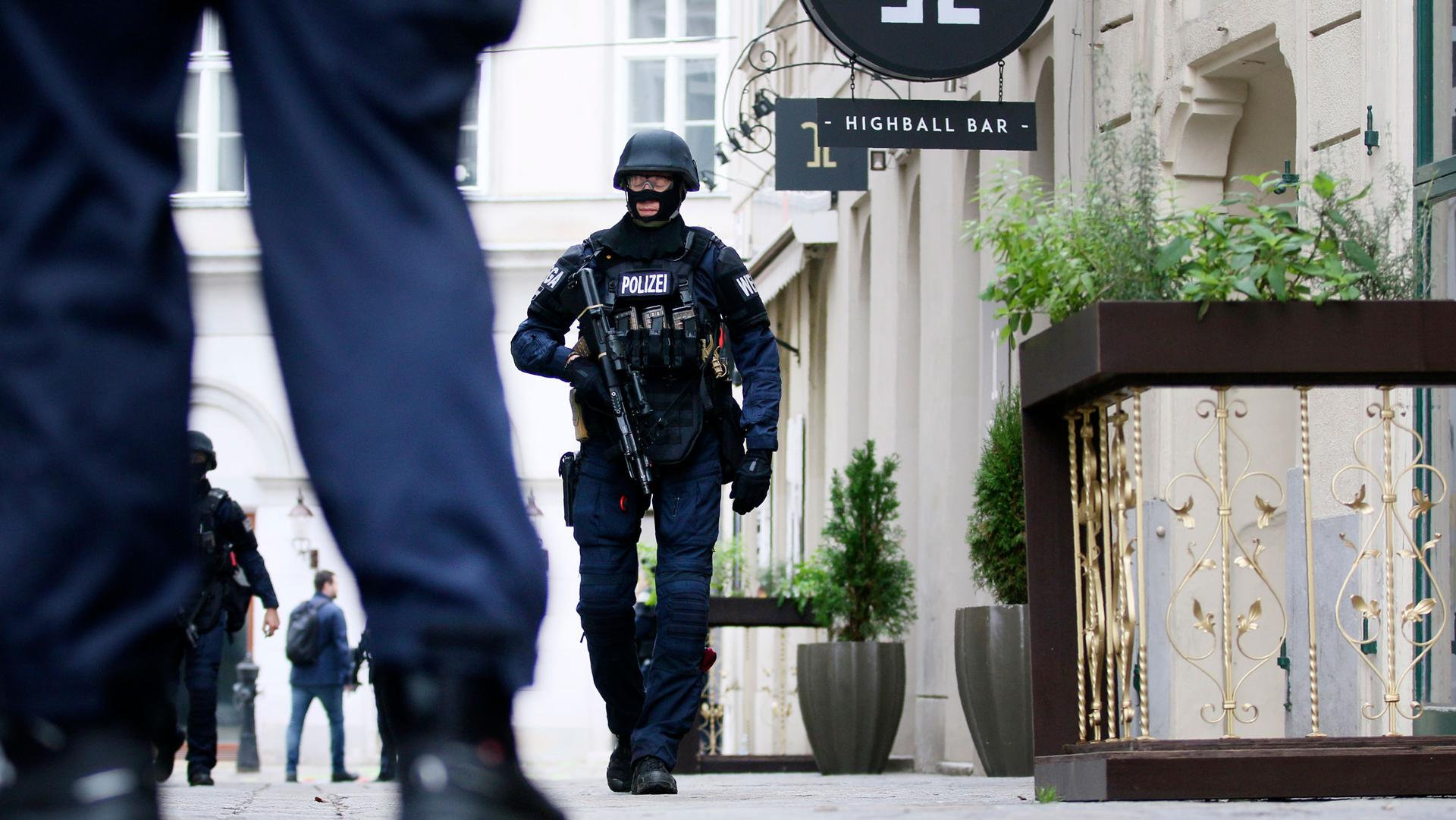Attack in Vienna hit nightlife; suspect sought to join ISIS
After a shooting an armed police officers patrols on a street at the scene in Vienna, Austria, Nov. 3, 2020.
Armed with an automatic rifle and a fake explosive vest, a 20-year-old Islamic extremist rampaged through a Vienna nightlife district hours ahead of a coronavirus lockdown, fatally shooting four people before he was killed by police, Austrian authorities said Tuesday.
The suspect in Monday night’s attack was identified as a young Austrian-North Macedonian dual citizen with a previous terror conviction for attempting to join the ISIS extremist group in Syria.
Unverified video showed the gunman, dressed in white coveralls, firing off bursts apparently at random as he ran down the Austrian capital’s cobblestone streets.
Police searched 18 properties as well as the suspect’s apartment, detaining 14 people associated with the assailant who are being questioned, Interior Minister Karl Nehammer said.
Two men and two women died from their injuries in the attack. Authorities said a police officer who tried to get in the way of the attacker was shot and wounded, along with 21 other people.
“Yesterday’s attack was clearly an Islamist terror attack,” Chancellor Sebastian Kurz said. “It was an attack out of hatred — hatred for our fundamental values, hatred for our way of life, hatred for our democracy in which all people have equal rights and dignity.”
The attacker, identified as Kujtim Fejzulai, was sentenced to 22 months in prison in April 2019 because he had tried to travel to Syria to join the ISIS. He was granted early release in December under juvenile law.
Nehammer told news agency APA that Fejzulai had posted a photo on his Instagram account before the attack that showed him with two of the weapons he apparently used.
At a later news conference, Nehammer said the assailant was armed with a fake explosive vest, a Kalashnikov, an automatic rifle, a handgun and a machete.
Authorities worked well into Tuesday to determine whether there were any other attackers. People in Vienna were urged to stay at home if possible on Tuesday and children did not have to go to school. Some 1,000 police officers were on duty in the city on Tuesday morning.
By mid-afternoon, investigators working through copious video evidence had found “no indication of a second perpetrator,” Nehammer said. “But because the evaluation is not yet concluded, we cannot yet say conclusively how many perpetrators are responsible for the crime.”
For the time being, an elevated security level will remain in place in Vienna along with a reinforced police presence, he said.
The shooting began shortly after 8 p.m. Monday near Vienna’s main synagogue as many people were enjoying a last night of open restaurants and bars before a month-long coronavirus lockdown, which started at midnight.
“We will unearth and chase down the perpetrators, those behind them and like-minded people and give them the punishment they deserve,” Kurz said. “We will pursue all those who have anything to do with this outrage by all available means.”
His government on Tuesday ordered three days of official mourning, with flags on public buildings to be flown at half-staff until Thursday.
Austria held a minute of silence at midday Tuesday, accompanied by the tolling of bells in the capital. Kurz, President Alexander Van der Bellen and other leading politicians laid wreaths and candles where the attack took place.
Alois Schroll, an Austrian lawmaker and the mayor of the town of Ybbs, said he had just arrived at a nearby restaurant when the attack started. He said he “saw many, many people running with their hands up high, they were in a panic and screaming.”
Police “sealed off the entire restaurant,” Schroll, 52, told The Associated Press. “People started getting phone calls … so finally we understood what was going on.”
“People inside the restaurant were in shock, there were several women who were crying. And it wasn’t until shortly before 1 a.m., that police finally let us out of the restaurant.”
Schroll said he wasn’t allowed back to his apartment because the area was still blocked off — “instead, we had to go across a bridge, also with our hands raised up. We couldn’t find a hotel, so we were just wandering around for hours.”
Fejzulai’s lawyer in the 2019 case, Nikolaus Rast, told public broadcaster ORF that his client had seemed “completely harmless” at the time.
“He was a young man who was searching for his place in society, who apparently went to the wrong mosque, ended up in the wrong circles,” Rast said. “I can’t say exactly what happened.”
Fejzulai’s family “wasn’t strictly religious at all; the family wasn’t radical — it was a completely normal family,” Rast said. “I still remember that the family couldn’t believe what had happened with their son.”
The attack drew swift condemnation and assurances of support from leaders around Europe, including from French President Emmanuel Macron, whose country has experienced three Islamist attacks in recent weeks, German Chancellor Angela Merkel. US President Donald Trump also condemned “yet another vile act of terrorism in Europe.”
By Philipp Jenne and Geir Moulson/AP
Our coverage reaches millions each week, but only a small fraction of listeners contribute to sustain our program. We still need 224 more people to donate $100 or $10/monthly to unlock our $67,000 match. Will you help us get there today?
